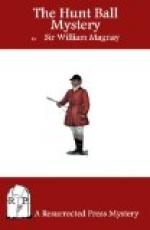For a while she was silent, her breath coming quickly, as she hesitated how to meet the direct question. Gifford hated, yet somehow rejoiced, to see this proud, cold-mannered girl brought to this pass, and the reason he rejoiced lay in the knowledge that he could help her out of it.
At length she spoke. “Mr. Gifford, I trust you as a man of honour. Your conjecture is right, but unhappily there is no help for it.”
“There is help,” he declared reassuringly. “Can this man prove that you are in any way guilty of his brother’s death?”
The girl gave a shiver. “He can by implication,” she admitted in a low voice.
“Can he prove it?”
“Not actually, perhaps. But far enough to disgrace me and mine for ever,” she said with a sob.
“And with that idea he terrorizes you?” The question was put with quiet sternness.
“Yes, yes; but I cannot help it! I cannot bear it. Oh, let me go.” She seemed now in an agony of fear.
Gifford laid his hand on her as she sought to move away towards the gate and the waiting enemy.
“Miss Morriston,” he said with decision, “you must not go; you must have no more communication with this man Henshaw. He can prove nothing against you, while I can prove everything in your favour.”
Her look of fear and impatience changed at the last words to one of startled incredulity.
“You, Mr. Gifford? What do you mean?”
“Exactly what I say,” he returned decisively, “I can prove, if need be, that you had no hand in that cowardly ruffian’s death.”
“You? How?” the girl gasped, staring at him with dilated eyes.
“I will convince you,” he answered quietly. “When I told you the other day that I had found your brooch on the lawn I said, for an obvious reason, what was not true. I found it in the room where Clement Henshaw died.”
“You did,” the girl gasped almost in terror. “When?”
“A few minutes after his death,” Gifford replied calmly. “I happened to be present in the room when he came by his fatal wound.”
CHAPTER XX
AN INVOLUNTARY EAVESDROPPER
As she heard the words Edith Morriston stood for a moment as though transfixed, and then staggered back grasping at a tombstone for support. Gifford took a quick step forward, but before he could be of help she had recovered from the shock, and motioning him back, was looking at him with incredulous eyes.
“You were there?” she repeated, with more suspicion now than unbelief.
“In that room at the top of the tower; yes; by accident,” he answered in a tone calculated to reassure her.
“Then you know—you saw what happened?”
He bowed his head in assent. “Enough to be sure that Mr. Clement Henshaw was a great scoundrel, and that his fate was not altogether unmerited. Now,” he added in a tone of decision, “you will have nothing more to do with this Gervase Henshaw, or he with you.”




